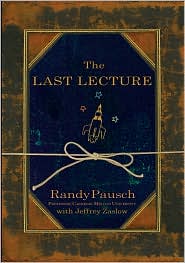The Last Lecture is a book based on an internet sensation, the “Last Lecture” given by computer scientist Randy Pausch at Carnegie-Mellon University. Pausch died tragically of pancreatic cancer in 2008; the principles he discusses in his last lecture (and in a companion lecture on time management, both of which are available on the internet) take on a whole new meaning in light of the fact that they were given by a man who was face-to-face with his own mortality. The book has much to recommend it to the reader of Lifehack. Pausch was the consummate go-getter who inherited from his parents a drive to go out and get the answers to questions rather than to simply ask questions (p. 22). He inherited from his youth football coach a reverence for fundamentals and execution, without which “the fancy stuff is not going to work” (p. 36). Pausch highlights this by asking whether self-esteem is something that can be given, as many educational theorists argue, or whether it is something that is developed by developing the ability to do things that one previously couldn’t do. Pausch illustrates the principles he lays out with examples from his academic career. He encouraged students to listen to those who would criticize them because this meant that they actually cared about their performance (pp. 36-37). He mentions a meeting with William Shatner and holds up hiss earnest attitude and desire to learn about virtual reality as a quality that would be admirable in any graduate student (p. 45). He discusses the power of framing in light of Disney employees who, when asked when the park closes, would reply that “the park is open until 8:00” (p. 62, emphasis added). Among Pausch’s theme is his point that people are more important than things (pp. 69-70). For the Pausch family, cars were never a status symbol but were instead means of getting from one place to another. This point resonates with me in light of a recent addition to our family (our son, Jacob, was born at the end of July). Life is too short and family and friends are too precious to worry about whether a car, couch, or carpet will survive if something is spilled on it. Pausch didn’t sweat small details and uses a story about his wife crashing one of their cars into another to argue that “not everything needs to be fixed” (p. 87). Particularly after it was discovered that his cancer was terminal, he and his wife had to learn that small things, like clothes left on the floor, don’t matter in the grand scheme of things. The book is strongest when it moves to practical application. As a professor myself, I found that much of what Pausch had to say about organization, teaching, and disposition resonated with me. In discussing his educational philosophy, he argued that “educators best serve students by helping them be more self-reflective” (p. 112). Through the second half of the book he offers a number of pithy expressions, some recycled and some original, that illustrate important principles about how to actually live. Chapter 29 is titled “Earnest is Better Than Hip.” On page 134 he reproduces advice from his parents, who said that “you buy new clothes when your old clothes wear out.” A chapter beginning on page 138 exhorts us: “Don’t Complain, Just Work Harder” because “complaining does not work as a strategy” (p. 139). He encourages people to discount what people say and pay attention to what they do. He leaves us with sound advice about apologies (p. 161), honesty (pp. 163-164), and humility (pp. 168-170). I found an anecdote about treating symptoms rather than disease quite compelling (pp. 139-140). Pausch tells us about a girl he knew who tried to deal with her financial problems through Tuesday night yoga. Pausch pointed out to her that if she worked evenings and gave up yoga, she would be able to pay off her debts within a few months. She did so, and I presume she was able to enjoy her yoga on a whole new level after her debts had been paid off. The Last Lecture is a quick, easy read that has much to recommend it to anyone and everyone interested in improving their performance. The tragic context in which the book was written makes it all the more poignant. Randy Pausch is no longer with us, but his legacy will live on in The Last Lecture.

